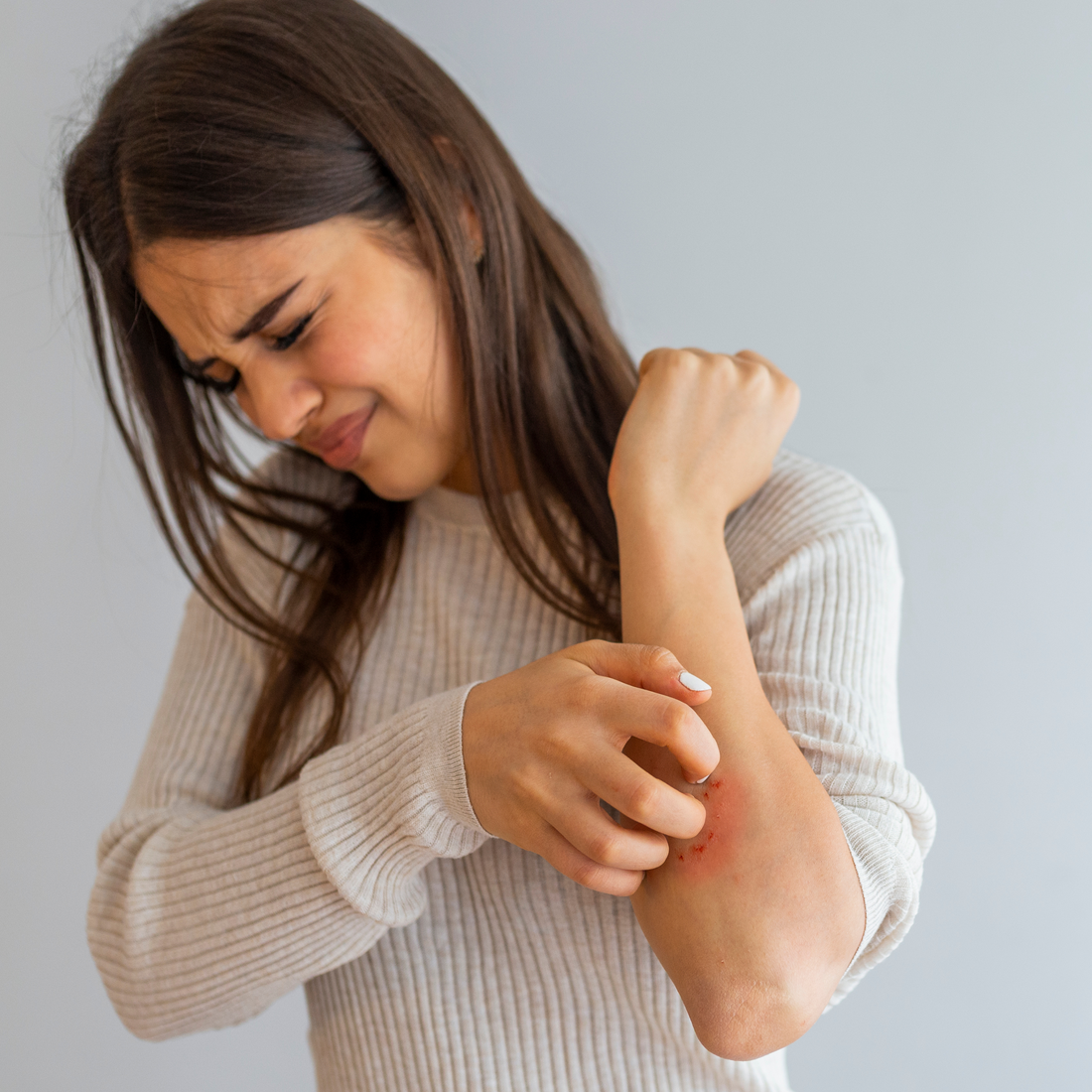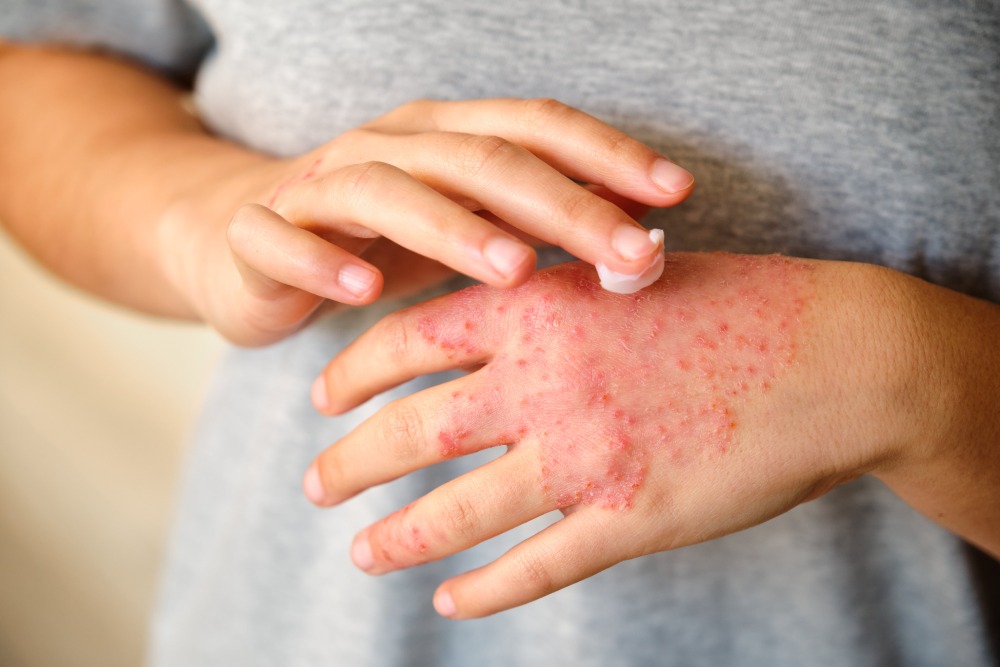
Eczema: Understanding Causes, Symptoms, and Treatments
Eczema, also known as atopic dermatitis, is a chronic skin condition that causes dry, itchy, and inflamed skin. It affects people of all ages but is more common in children. Atopic dermatitis can vary in severity and tends to flare up periodically, leading to discomfort and frustration for those who suffer from it. This blog will explore the causes, symptoms, and most effective treatments to help manage eczema and improve skin health.
What is it?
Atopic dermatitis is a condition characterized by patches of inflamed, itchy, cracked, and rough skin. In some cases, blisters can also appear. It is not contagious, but it can significantly impact a person's quality of life due to the discomfort it causes. Atopic dermatitis often begins in early childhood, but it can occur at any age.
There are several types of eczema, including atopic dermatitis (the most common), contact dermatitis, dyshidrotic eczema, and nummular eczema. Each type varies slightly in its symptoms and triggers.
Causes
While the exact cause of atopic dermatitis remains unknown, researchers believe it develops due to a combination of genetic and environmental factors. People with eczema usually have an overactive immune system that responds aggressively to certain triggers. Below are some common causes and triggers of atopic dermatitis:
- Genetics: A family history of atopic dermatitis, asthma, or hay fever increases the likelihood of developing eczema.
- Immune System Dysfunction: When the immune system overreacts to irritants or allergens, it triggers inflammation, leading to atopic dermatitis symptoms.
- Environmental Triggers: Factors like pollution, pollen, dust mites, and tobacco smoke can worsen atopic dermatitis.
- Allergens: Certain allergens, such as pet dander, mold, and specific foods (e.g., dairy, nuts, or wheat), can trigger flare-ups.
- Skin Irritants: Harsh soaps, detergents, fragrances, and other chemical irritants may exacerbate atopic dermatitis.
- Climate: Extremely cold or hot temperatures and dry air can also make atopic dermatitis worse.
Common Symptoms of Eczema
Atopic dermatitis symptoms vary from person to person, but the most typical signs include:
- Itchy Skin: The itchiness can be intense, often becoming worse at night.
- Dry, Cracked Skin: A hallmark of eczema, the skin becomes dry, rough, and prone to cracking.
- Red or Brownish Patches: Inflamed areas of skin can appear on the hands, feet, ankles, wrists, neck, and upper chest, as well as on the inside of the elbows and knees.
- Thickened Skin: Continuous scratching or rubbing can cause the skin to thicken, a condition known as lichenification.
- Blisters: Small, fluid-filled bumps that may ooze and scab over.
- Scaly Patches: Particularly on the face and scalp in infants, this symptom is known as cradle cap.

Effective Treatments
Although there is no cure for atopic dermatitis, a range of treatments can help manage symptoms and prevent flare-ups. Below are some of the most effective options:
1. Moisturizers and Emollients
Hydrating the skin is essential for managing atopic dermatitis. Applying thick moisturizers and emollients can help create a protective barrier, preventing moisture loss. Look for products with ingredients like ceramides, shea butter, and glycerin. Be sure to avoid any skincare products with fragrances or dyes, as these can trigger symptoms.
Shop a selection of the best moisturizers at : Deriak - Moisturizers
2. Topical Steroids
For more severe atopic dermatitis flare-ups, doctors may prescribe corticosteroid creams or ointments. These medications reduce inflammation, redness, and itchiness. However, long-term use should be avoided to prevent skin thinning and other side effects.
3. Antihistamines
Over-the-counter antihistamines can provide relief from the intense itching associated with atopic dermatitis, particularly at night. However, they should only be used as directed, and some types may cause drowsiness.
4. Immunosuppressants
In cases where atopic dermatitis is resistant to topical treatments, immunosuppressant drugs such as cyclosporine or methotrexate may be prescribed. These medications help control the immune system's overactivity, reducing inflammation and preventing flare-ups.
5. Phototherapy
For individuals with moderate to severe eczema that doesn’t respond to topical treatments, ultraviolet (UV) light therapy may be an option. Phototherapy exposes the skin to controlled amounts of UV light, which can reduce inflammation and improve skin health.
6. Biologic Drugs
Biologics, like dupilumab, are a newer class of drugs designed to target specific parts of the immune system. These medications are usually prescribed for severe cases of atopic dermatitis that haven't responded to other treatments. Biologics can significantly reduce symptoms and improve skin quality.
Lifestyle Changes to Manage atopic dermatitis
In addition to medical treatments, making certain lifestyle changes can help prevent eczema flare-ups and reduce symptoms:
- Avoid Triggers: Identifying and avoiding atopic dermatitis triggers like specific foods, allergens, or irritants can help minimize flare-ups.
- Maintain Hydration: Keeping the skin hydrated by applying moisturizer several times a day is essential, especially after bathing or showering.
- Use Mild Cleansers: Choose soap-free, gentle cleansers that don’t strip the skin of its natural oils.
- Wear Soft Fabrics: Clothing made from natural fibers like cotton can help reduce irritation. Avoid wool and synthetic fabrics, which can aggravate atopic dermatitis.
- Stress Management: Stress is a known trigger for atopic dermatitis. Practicing relaxation techniques such as meditation, yoga, or deep breathing can help manage stress and prevent flare-ups.
When to See a Doctor
If atopic dermatitis symptoms are severe, widespread, or not responding to over-the-counter treatments, it's essential to see a healthcare provider. Persistent eczema can lead to complications such as infections or permanent skin damage. A doctor can help develop a personalized treatment plan to manage the condition effectively.
For more in-depth information about managing atopic dermatitis, you can visit reputable sources like the National Eczema Association or Mayo Clinic.
Conclusion
Atopic dermatitis can be a challenging condition to live with, but with the right treatments and lifestyle changes, it’s possible to manage symptoms effectively. Understanding your triggers, keeping your skin hydrated, and following a doctor-recommended treatment plan are essential steps in maintaining healthy, eczema-free skin.
